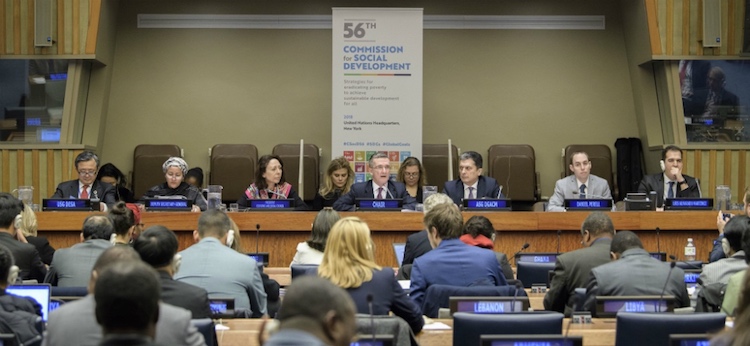By J Nastranis
NEW YORK (IDN) – While progress has been achieved in realizing Sustainable Development Goals (SDGs), adopted by the United Nations in September 2015, Deputy Secretary-General Amina Mohammed has warned that “the drop in extreme poverty remains uneven across regions, within countries and between various social groups.”
Addressing the opening of the fifty-sixth session of the Commission for Social Development (CSocD56), she however remarked: “At the global level, we have experienced impressive reductions in extreme poverty. Significant progress has also been made in improving access to schooling and healthcare, promoting the empowerment of women, youth, persons with disabilities, older persons and indigenous populations.”
The Commission is the advisory body responsible for the social development pillar of global development. Its 56th session concluded on February 7 with the adoption of policies – including the establishment of nationally appropriate social protection systems – to be taken by government and the civil society to help the millions of people living in poverty and those in vulnerable situations.
What the UN Deputy Secretary-General had in mind was that while nearly 1.1 billion people have risen from extreme poverty since 1990, many are living barely above the poverty line of $1.90 a day. The vulnerable groups, which include women, children, youth, persons with disabilities, indigenous peoples, and older persons, suffer greater degrees of poverty.
At present, there are an estimated 1 billion people with disabilities, 80 per cent of whom live in developing countries and face poverty, while in most countries indigenous peoples have higher infant and maternal mortality rates.
Indeed the 2030 Agenda for Sustainable Development recognizes that sustainable development can only be achieved with the eradication of poverty. At the Commission, the importance of creating productive employment and decent work for all, investing in people’s capacities and skills, and the development of a socio-economic framework were highlighted as effective strategies for ending poverty.
Participants also advocated social protection systems as critical to reducing poverty, tackling inequality and promoting inclusive economic growth.
At present, only 29 per cent of the global population are covered by comprehensive social security systems that include the full range of benefits from child and family benefits to old-age pensions.
“Since the 1995 World Summit for Social Development, this Commission has been a vital global platform for sharing good policies and practices, and exchange of information and knowledge and innovative social policies and development, aimed at eradicating poverty, combating inequality, fostering job creation, investing in education and health, and scaling up the provision of social protection,” stated UN Under-Secretary-General for Economic and Social Affairs Liu Zhenmin in his opening remarks at the Commission.
Since the World Summit for Social Development in Copenhagen, the Commission for Social Development (CSocD) has been the key UN body in charge of the follow up and implementation of the Copenhagen Declaration and Programme of Action.
Originally established as the Social Commission in 1946, and renamed in 1966, CSocD was mandated to advise the Economic and Social Council (ECOSOC) on social questions of a general character, on practical measures needed in the social field and on international agreements and conventions on any of these matters and on their execution; as well as report to ECOSOC on the extent to which the recommendations of the United Nations in the field of social policy are being carried out.
In particular, the Commission recommended four draft resolutions to the ECOSOC, on ageing, future working methods, strategies for eradicating poverty and Africa’s development.
The ‘Future organization and methods of work of the Commission for Social Development’ (document E/CN.5/2018/L.5) was approved without a vote as orally revised. The ECOSOC would decide that, going forward, the Commission would consider a single priority theme at each session, leading to the proposal of an action‑oriented resolution with recommendations to the Department of Economic and Social Affairs.
It would also decide that the 2019 priority theme would be ‘Addressing inequalities and challenges to social inclusion through fiscal, wage and social protection policies’, and further request the Commission to adopt a multi‑year programme of work to guide its future sessions.
In closing remarks, the Chair of the Commission, Nikulas Hannigan (Iceland) said the session’s work had proceeded smoothly thanks to efforts by the Secretariat, the Vice‑Chairs, a number of strong keynote speakers and a range of other participants.
Over eight days, the Commission convened four substantive panel discussions, each of which was followed by highly interactive discussions. There had also been an unprecedentedly robust level of participation by civil society, whose forum had been incorporated in the Commission’s work for the first time. Nevertheless, Hannigan said, the Commission could become even stronger and more focused in future sessions, working to support not only the agenda of the Economic and Social Council but also carrying more value “in and of itself”.
Noting that the Commission had decided, through the resolutions adopted on February 7 to take up several new working methods, he said that going forward it would consider a single priority theme each year. That change that would help it “keep in step” with the Economic and Social Council’s work, he said, adding that the Commission would develop an action‑oriented resolution on its theme to present each year to the Council.
During its 2019 session, the Commission would also elaborate a multi‑year programme of work, and consider how to better support implementation at the national level “for those who need it most”.
Immediately following the closure of the fifty‑sixth session, the Commission opened the first meeting of its fifty‑seventh session in order to elect, by acclamation, Sama Salim Poules Poules (Iraq) as Vice‑Chair. [IDN-InDepthNews – 25 February 2018]
Photo: Opening session of the fifty-sixth session of the Commission for Social Development. Credit: UN
IDN is flagship agency of the International Press Syndicate.
facebook.com/IDN.GoingDeeper – twitter.com/InDepthNew

